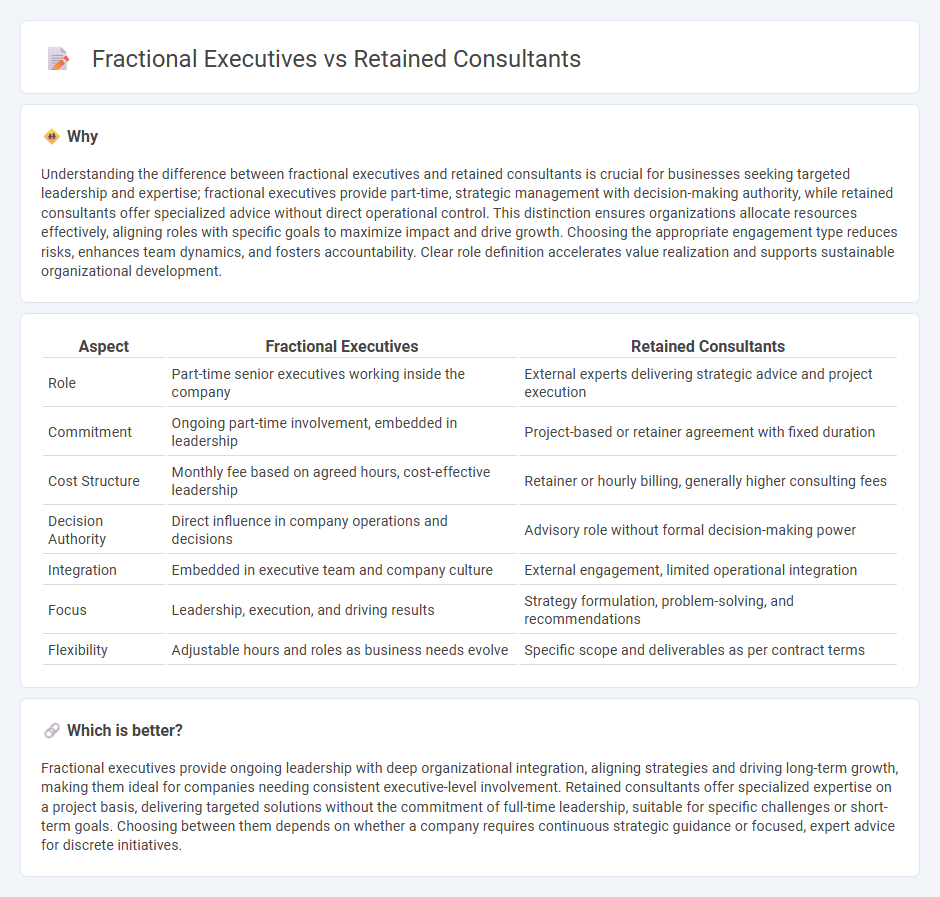
Fractional executives offer part-time leadership roles focusing on strategic decision-making, often embedded within the company's operations to drive growth and transformation. Retained consultants provide expert advice on specific projects or challenges, working externally to deliver specialized solutions without direct management involvement. Explore the distinct advantages of fractional executives versus retained consultants to determine the best fit for your organization's needs.
Why it is important
Understanding the difference between fractional executives and retained consultants is crucial for businesses seeking targeted leadership and expertise; fractional executives provide part-time, strategic management with decision-making authority, while retained consultants offer specialized advice without direct operational control. This distinction ensures organizations allocate resources effectively, aligning roles with specific goals to maximize impact and drive growth. Choosing the appropriate engagement type reduces risks, enhances team dynamics, and fosters accountability. Clear role definition accelerates value realization and supports sustainable organizational development.
Comparison Table
| Aspect | Fractional Executives | Retained Consultants |
|---|---|---|
| Role | Part-time senior executives working inside the company | External experts delivering strategic advice and project execution |
| Commitment | Ongoing part-time involvement, embedded in leadership | Project-based or retainer agreement with fixed duration |
| Cost Structure | Monthly fee based on agreed hours, cost-effective leadership | Retainer or hourly billing, generally higher consulting fees |
| Decision Authority | Direct influence in company operations and decisions | Advisory role without formal decision-making power |
| Integration | Embedded in executive team and company culture | External engagement, limited operational integration |
| Focus | Leadership, execution, and driving results | Strategy formulation, problem-solving, and recommendations |
| Flexibility | Adjustable hours and roles as business needs evolve | Specific scope and deliverables as per contract terms |
Which is better?
Fractional executives provide ongoing leadership with deep organizational integration, aligning strategies and driving long-term growth, making them ideal for companies needing consistent executive-level involvement. Retained consultants offer specialized expertise on a project basis, delivering targeted solutions without the commitment of full-time leadership, suitable for specific challenges or short-term goals. Choosing between them depends on whether a company requires continuous strategic guidance or focused, expert advice for discrete initiatives.
Connection
Fractional executives and retained consultants are connected through their complementary roles in providing expert strategic guidance to businesses on a flexible basis. Both offer specialized knowledge--fractional executives integrate deeply within company leadership for part-time engagement, while retained consultants deliver focused advisory services over agreed periods. Their collaboration enhances organizational decision-making, driving sustainable growth by leveraging external expertise without the full-time commitment.
Key Terms
Engagement Model
Retained consultants offer ongoing, long-term advisory services with a fixed monthly fee, ensuring consistent access to specialized expertise, while fractional executives provide part-time leadership roles with hands-on management and decision-making responsibilities tailored to the company's strategic needs. The engagement model for retained consultants emphasizes scheduled consultations and deliverables without direct operational control, whereas fractional executives integrate into the company's leadership team, aligning closely with internal workflows and objectives. Explore the key differences in engagement models to determine the best fit for your business growth strategy.
Scope of Work
Retained consultants typically provide specialized expertise for specific projects or ongoing advisory roles with a defined scope of work limited to particular tasks or outcomes. Fractional executives, on the other hand, offer broader leadership responsibilities, managing multiple strategic and operational functions part-time within an organization. Explore the distinct advantages of each arrangement to determine the best fit for your business needs.
Compensation Structure
Retained consultants typically operate under a predetermined fee arrangement, often receiving a fixed monthly retainer that ensures their availability and ongoing strategic input without equity or profit sharing. Fractional executives are compensated through a blend of salary, performance bonuses, and sometimes equity stakes, aligning their incentives closely with company growth and long-term success. Explore deeper insights into how these compensation structures impact organizational dynamics and performance.
Source and External Links
Retained Consulting - Keith D. Walker - Retained consulting is a long-term engagement where consultants provide ongoing assessment, coaching, and development services, often including direct and scheduled support for key organizational leaders.
Retained Consulting Services - JER HR Group - Retained consulting services offer ongoing HR partnership for recruitment, employee engagement, performance management, and organizational development on a retainer basis to add sustained value.
Retained Executive Search vs Contingency: What's the Difference? - Retained consultants in executive search work exclusively on senior roles, acting as trusted advisors paid via retainer fees to deliver focused, high-level talent acquisition and ensure successful leadership hires.
 dowidth.com
dowidth.com